If you’ve ever looked into following a low-carb diet, you definitely know all the benefits that come from it.
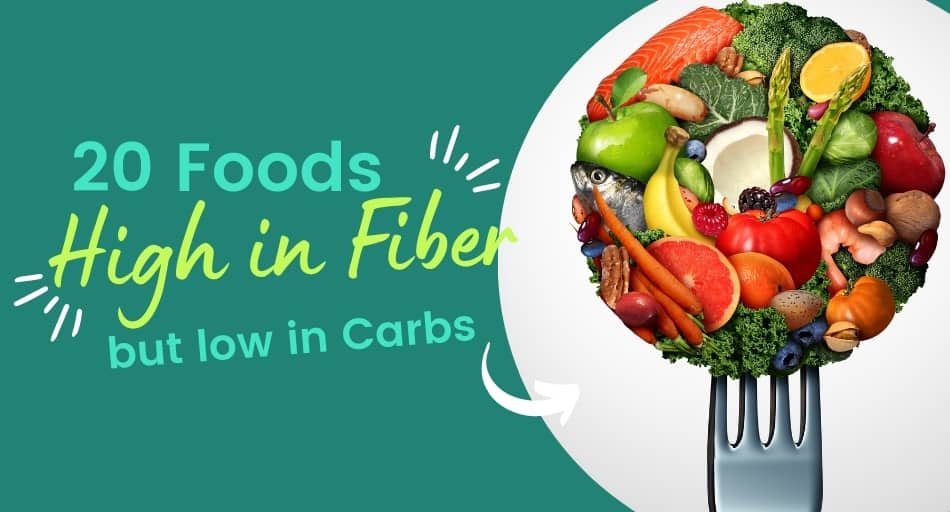
For example, a diet low in carbs can help reduce hunger, contribute to healthy weight loss, and improve your cholesterol levels.
But unfortunately, some low-carb diets are also low in fiber, which is an important macronutrient.
So, this means that if you want to follow a low-carb diet, you should strive to eat foods that are low in carbohydrates but high in fiber.
While fiber is a carb, so it might seem counterintuitive, there are, in fact, many high-fiber but low-carb foods. From veggies through fruits to grains, there is a wide variety of foods you can include on a low-carb diet that still pack a good dose of fiber and many health benefits from vitamins and minerals.
Table of Contents
20 Foods High In Fiber But Low In Carbs
1. Avocado
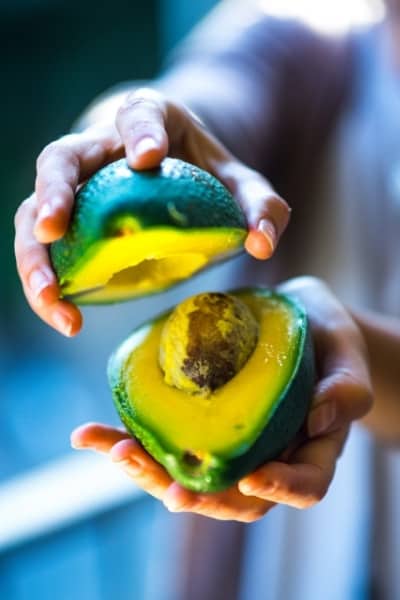
A one-cup serving of sliced avocado provides you with 10.1 g of fiber and just 2.7 g of net (digestible) carbs.
This amount of fiber equals 40% of your daily recommended need for this nutrient, which is a lot.
Avocados are also a great source of healthy fats, vitamin C, folate, vitamin K, and potassium. Eating avocados has also been linked with better cholesterol levels and a reduced risk of various cardiovascular issues, making this fruit a delicious addition to any diet.
2. Flax Seeds
A one-ounce serving of flax seeds contains 7.6 g of fiber and just about 0.5 g of carbs. This makes flax seeds a wonderful source of fiber while still being low in carbs.
Flaxseeds also contain loads of powerful plant compounds that have been known to prevent indigestion. These seeds are also an excellent thiamin, magnesium, and phosphorus source.
3. Chia Seeds
A one-ounce serving of chia seeds contains 10.6 g of fiber and 1.7 g of digestible carbs. This type of seed is very high in fiber, thus great for the health of your digestive system.
Chia seeds are also a wonderful source of several minerals, including calcium, phosphorus, and manganese.
They’re a delicious addition to smoothies, fruit bowls, and salads, helping you up your intake of fiber very easily.
4. Almonds
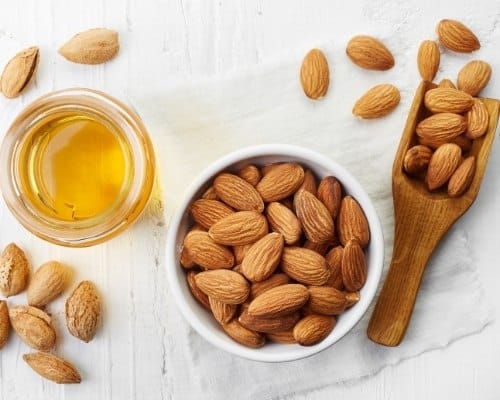
One ounce of dry-roasted almonds contains 3.3 g of fiber and 2.1 g of carbs. While it might be slightly lower than some other foods, calorie per calorie, almonds are still a wonderful source of fiber while remaining low-carb.
Almonds also provide you with a good dose of vitamin E, healthy fats, riboflavin, magnesium, and manganese. Some people even include almonds on a weight loss diet with great benefits.
5. Artichokes
Just half a cup of cooked artichokes contains 7.2 g of fiber and 2.8 g of carbs. Considering that most people tend to eat more than that in a single meal, it’s a great amount.
Artichokes are very easy to prepare and add to any dish. They’re also a good source of vitamin K, folate, potassium, and manganese.
Artichokes are low in calories as well, which means that they can contribute to healthy weight loss.
6. Celery
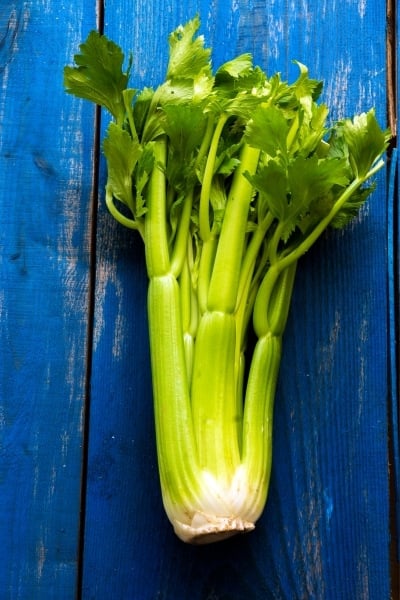
One cup of cooked celery contains 2.4 g of fiber and 3.6 g of carbs. Calorie per calorie, celery is high-fiber and low in calories, carbs, and fats, making it a very healthy veggie.
In terms of micronutrients, celery packs a great dose of vitamin K, vitamin C, folate, and potassium, which all contribute to good health and fight against diseases.
7. Mushrooms
One cup of cooked sliced mushrooms contains 3.4 g of fiber and 4.9 g of digestible carbs.
Most of the calories in mushrooms also come from protein and carbohydrates, making mushrooms a healthy food for a weight loss-friendly diet.
Mushrooms are also rich in riboflavin, niacin, and pantothenic acid, as well as copper, iron, and selenium, which means that they can help you load up on these vitamins and minerals.
8. Strawberries
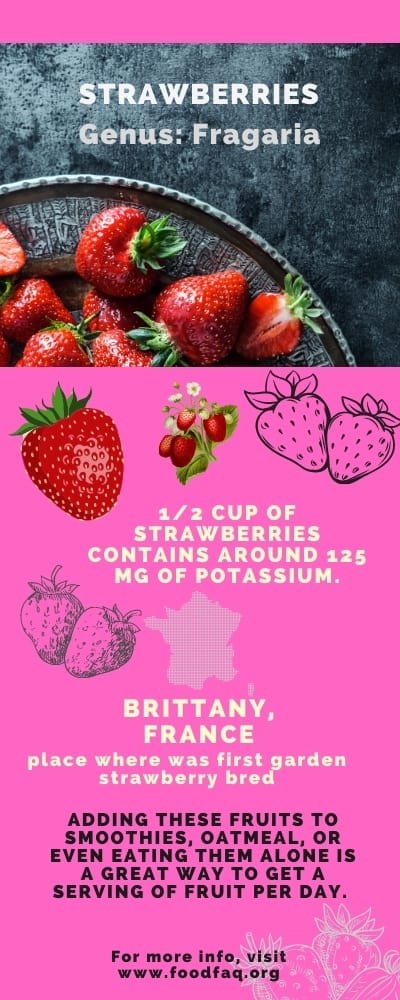
While slightly lower in fiber than other foods on this list, strawberries are still considered high-fiber and low-carb.
One cup of halved strawberries contains 3 g of fiber and 8.7 g of carbs. Strawberries provide you with around 12% of your daily need for fiber as well as a good dose of vitamin C, folate, potassium, and manganese.
This fruit is very easy to add to any diet, so you can easily reap the health benefits it offers.
9. Bell Peppers
One cup of chopped red bell peppers provides you with 3.1 g of fiber and 6.3 g of carbs.
Aside from being high in fiber, bell peppers are also loaded with micronutrients, including vitamin C, vitamin C, vitamin B6, potassium, and manganese.
They also contain a great number of antioxidants, which are compounds that help reduce your risk of various health conditions, such as cancer and heart disease.
10. Coconut meat
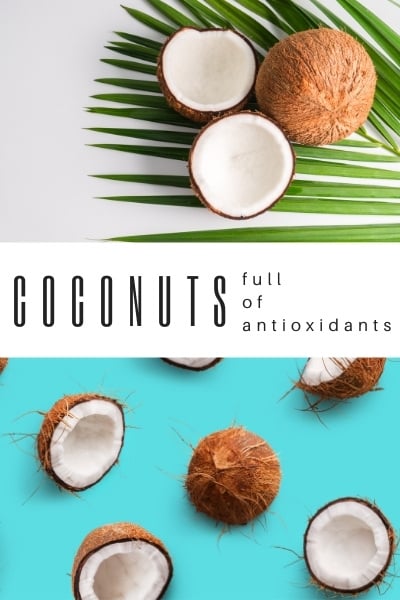
One cup of shredded coconut meat contains 7.2 g of fiber and 5 g of carbs. This only applies to coconut meat, as coconut milk and water don’t contain nearly as much fiber.
In addition, coconut meat contains healthy fats that keep your heart healthy and many micronutrients like folate, iron, phosphorus, potassium, and manganese.
Coconut meat is delicious and can be an easy way to add flavor to many dishes.
11. Blackberries
A one-cup serving of blackberries packs 7.6 g of fiber and 7.1 g of carbs. Blackberries are also low in calories but rich in vitamins like vitamin C, vitamin K, and folate.
Eating blackberries can also help you load up on essential antioxidants and plant compounds that prevent oxidative stress and damage to your cells.
They’re also a great natural sweetener for desserts and smoothies.
12. Spinach
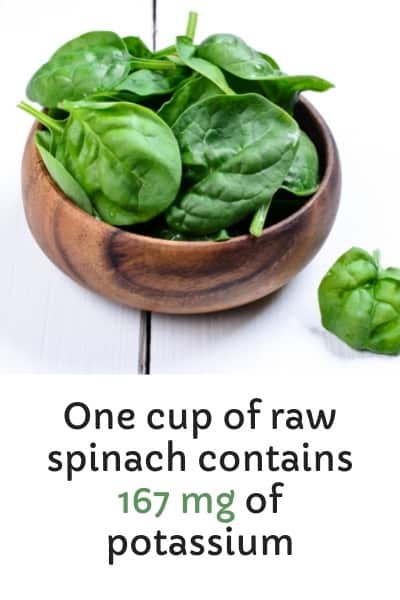
A one-cup serving of cooked spinach contains 4.3 g of fiber and 2.4 g of digestible carbs.
Looking at the calories and nutrients it provides, spinach is one of the most nutritious leafy greens out there.
It provides you with lots of vitamin A, vitamin K, vitamin C, riboflavin, and a little bit of every mineral your body requires. Spinach is also rich in antioxidants and plant compounds, benefiting your health even more.
13. Raspberries
One cup of raw raspberries has 8 g of fiber and just 6.7 g of carbs. This amount of fiber equals 32% of your daily recommended need for this nutrient, which is a lot considering that this fruit isn’t very high in calories.
Raspberries are also a great source of vitamin C, vitamin K, manganese, and magnesium.
They’re very easy to incorporate into any healthy diet, especially as they’re very tasty and sweet.
14. Pistachios
A one-ounce serving of dry-roasted pistachios contains 2.9 g of fiber and 4.9 g of carbs. Many people consume more than this serving in one sitting, so you’re likely to get even more fiber.
Pistachios are rich in healthy fats that keep your cardiovascular system healthy, preventing heart attacks and high blood pressure.
They also contain a great dose of thiamin, vitamin B6, phosphorus, and copper.
15. Wheat bran
One cup of wheat bran contains 24.8 g of fiber and just about 12.6 g of digestible carbs. This is quite a lot but remember that no one eats wheat bran by the cup.
Still, you’re very likely to get a lot of fiber from this food. Wheat bran is also rich in almost all B vitamins, manganese, magnesium, iron, phosphorus, and potassium.
So, adding foods made with wheat bran to your diet is incredibly beneficial.
16. Cauliflower
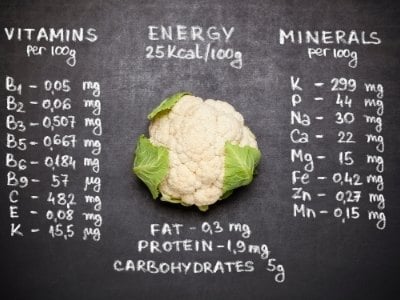
One cup of cooked cauliflower contains 2.8 g of fiber and 2.6 g of carbs. While very low in calories, cauliflower is rich in various micronutrients, such as vitamin C, vitamin K, and potassium.
Eating cauliflower can also help you stay hydrated as it’s primarily made of water.
What’s more, it’s loaded with antioxidants that help fight off chronic diseases, making for a great side dish.
17. Broccoli
A one-cup serving of cooked broccoli provides you with 5.2 g of fiber and 6 g of digestible carbs.
Broccoli is also a great source of protein, which, together with fiber, can help you lose weight and prevent overeating.
This veggie also contains great amounts of vitamins and minerals like vitamin C, vitamin K, folate, manganese, and potassium. As a result, adding broccoli to your diet can only improve your health.
18. Asparagus
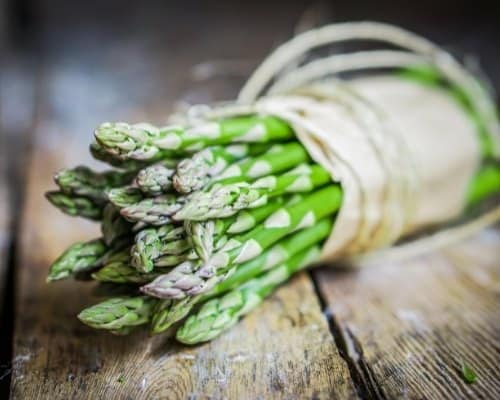
A one-cup serving of cooked asparagus provides you with 3.6 g of fiber and 3.8 g of carbs.
Asparagus is a great source of various antioxidants and contains plant compounds that help keep your urinary tract healthy.
It’s also a great source of vitamin K, folate, selenium, and potassium, among other micronutrients. Asparagus pairs well with fish and steak and is very easy to prepare as well.
19. Purple Cabbage
One cup of shredded cooked cabbage contains 4 g of fiber and 6.4 g of carbs. It’s incredibly low in calories but very nutrient-dense, providing you with vitamins and minerals like vitamin C, vitamin K, potassium, and manganese.
Red cabbage also helps your digestive system work properly, preventing various digestive issues, including GERD and even stomach ulcers.
20. Eggplant
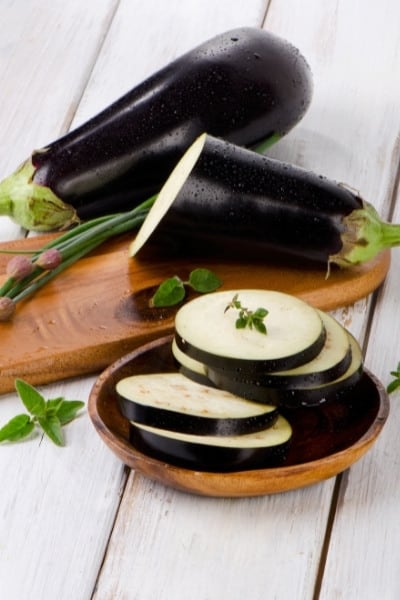
One cup of cooked eggplant slices contains 2.5 g of fiber and 6.1 g of digestible carbs. Eggplant is very low in calories but high in antioxidants and water, helping you stay hydrated and maintain electrolyte balance in your body.
This veggie also packs a good dose of manganese and vitamin K, contributing to good overall health.
Conclusion
As you can see, you don’t have to sacrifice your fiber intake when following a low-carb diet.
Simply choose some of the foods listed above, add them to your diet, and enjoy the health benefits that come with them.
Source: https://nutritiondata.self.com
